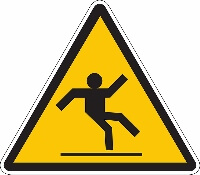A few years ago, I wrote an article titled “Legal Update: Slip and Fall on the Condominium Premises: Does the Condominium Owe a Statutory Duty to Its Co-owners?” The article centered around a 2015 published decision by the Michigan Court of Appeals in Francescutti v Fox Chase Condominium Association, 312 Mich App 640; 886 NW2d 801 (2015), which held that a co-owner who slip and fell on the common elements and suffered injuries to his hand and wrist could not recover from his Association or its property manager under a breach of contract or negligence theory.
On March 14, 2017, the Michigan Court of Appeals analyzed a similar case to Francescutti. In Zimmer v Harbour Cove on the Lake Condominium Community, et al, Unpublished Per Curiam Decision of the Michigan Court of Appeals, March 14, 2017 (No. 331545), Nick Zimmer visited a friend’s condominium and Mr. Zimmer slipped and fell on the condominium’s sidewalk breaking his femur. Mr. Zimmer sued the Association, its property manager and the snow removal company for his injuries. The defendants argued that Zimmer’s claims for negligence, premises liability and nuisance all sounded in premises liability and that such claims were barred by the Open and Obvious Doctrine. In essence, the defendants argued that 1) it was winter in Michigan, 2) it was cold, 3) there was snow on the ground and 4) there was snow where Zimmer fell. Previously, the Michigan Supreme Court held that open and obvious dangers are not recoverable absent ‘special aspects’ of the condition to justify imposing liability on a defendant. See Lugo v Ameritech Corp, 464 Mich 512 (2001). In support of his claim that there were “special aspects” of the icy condition, Zimmer stated that the downspouts were negligently placed in such a way for ice to develop over the sidewalk where he fell and that he fell on “black ice” that was not covered by snow.
In its analysis, the Michigan Court of Appeals stated that a danger is considered open and obvious “if, under an objective standard, it is reasonable to expect that an average person with ordinary intelligence would have discovered it upon casual inspection.” (citation omitted). If the defendants could prove that the danger was open and obvious, then Zimmer would not be able to recover for his damages. Ultimately, the Michigan Court of Appeals held that Zimmer’s injury was the result of an avoidable open and obvious danger and there was no evidence of a special aspect to the icy condition that would justify holding either the Association or its property manager liability under a premises liability theory. Thus, the location of the downspouts did not justify a “special aspect” of the icy condition because snow and ice are generally considered open and obvious conditions. Moreover, the “black ice” did not justify a “special aspect” where the presence of other indicia of a potentially hazardous condition, including wintery conditions, caused the “black ice” to be considered open and obvious. Therefore, the Court of Appeals upheld the trial court’s dismissal of the entire case against the defendants.
Conclusion
The Zimmer case is additional support of the decision rendered in Francescutti a few years earlier. Simply, if a condition is open and obvious on the common elements, the Association, its property manager and the snow removal company may avoid liability in Michigan. These decisions are important not only for associations, property managers and snow removal companies, but also for the insurance companies with policies for the associations, property managers and snow removal companies dealing with these situations as well.
Joe Wloszek is a Member of Hirzel Law, PLC where he focuses his practice on condominium and homeowner’s association law, commercial litigation, commercial real estate, large contractual disputes, and related real estate matters. Mr. Wloszek has been a Super Lawyers Rising Star in Real Estate Law from 2013-2018, an award given to only 2.5% of the attorneys in Michigan each year. He was also named a Top Lawyer in commercial law by DBusiness Magazine in 2014 and a Michigan Top Lawyer in real estate law by Michigan Top Lawyers in 2016. He is a Certified Real Estate Continuing Education Instructor through the State of Michigan and the past Chair of the Oakland County Bar Association Real Estate Committee. He can be reached at (248) 478-1800 or jwloszek@hirzellaw.com.

